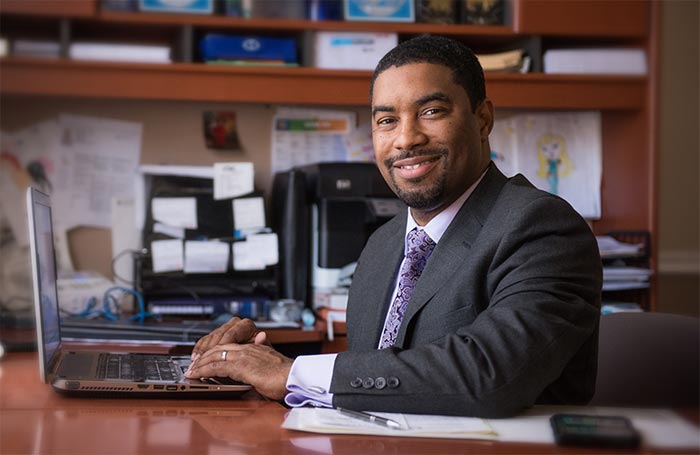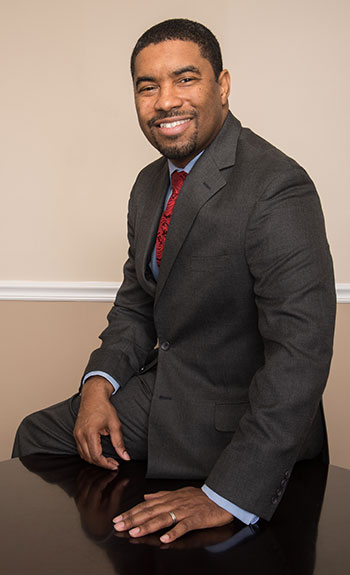Beyond MPT: An active way to diversify

Damon Ridley • Greenbelt, MD
Ridley Wealth Strategies • Householder Group Estate and Retirement Specialists • LPL Financial
Read full biography below
It was the 2000-02 time frame, when we were in the middle of what began as the dot-com meltdown. This was a very difficult time for advisors and investors—we had not seen anything quite like it with the creation of a whole new investment sector of technology companies. It became pretty apparent to me that there was the traditional diversification of modern portfolio theory (MPT), and then there was the opportunity to pursue a more active way to approach diversification.
What I mean by that is that many of the tenets of MPT are fundamentally sound over the long term, but it made very little sense to me to stick with investment sectors in the short run that were seeing huge continuous losses, while other sectors were faring much better. So, even if one were primarily long-only in orientation, there appeared to be better ways to more actively manage money than plain vanilla MPT and traditional asset allocation and rebalancing.
That was really the genesis of my thinking around active management. To put it as simply and logically as possible: Why keep money in an area that is going down when there’s another area that’s going up at the same time?
Where did that take your investment thinking?
In my advisory capacity, this made me intensely curious to find other potential strategies. I started to look for other ways to add alpha and be able to reduce a client’s risk exposure.
What’s interesting to me is the fact that clients often have a very common-sense way of viewing investments and their feelings about risk—they just do not have the experience, tools, or expertise to act upon those feelings in a disciplined or effective way. Investors inherently know it is not a good thing to see their portfolios go down 20%, 30%, or 40%. Why do so many advisors think that is acceptable?
I was determined not to be one of those advisors, and my outlook changed over the years to align very nicely with the common-sense views of most clients. The difference is that I have the technology and relationships with active money managers to be able to effectively implement the investment strategies that can work well for clients over time.

I educate clients on the purpose of active management: Reducing the amount of risk in their portfolios. Not necessarily to greatly enhance returns or beat the market each and every year, but to actually enhance total portfolio returns over time by minimizing large drawdowns, volatility, and fluctuations. Clients can reasonably expect to remain within a range of returns, depending on their objectives and risk profiles.
The secondary important benefit to this is that clients will be more likely to stick with their strategy consistently, therefore avoiding the pitfalls inherent in the sequence of returns and taking advantage of the compounding effect of those returns.
How do you educate clients on the investment process?
I think the large mutual fund companies, good as they may be in many areas, have so strongly and effectively marketed to the American public the idea of passive investing that it is important to start from square one with many clients. I discuss why having large portfolio drawdowns is such an issue, especially for those close to or in retirement—and I demonstrate the math on that.
We also talk about things like DALBAR research, which shows how the average investor on their own tends to make large mistakes with their portfolios and consistently underperforms the market by a large margin. Then we get into those benefits I mentioned of an integrated and active investment approach: That an actively managed portfolio can deliver competitive and smoother returns, that risk and drawdowns can be mitigated, and that over time they can expect to see compounded growth with less worry about day-to-day fluctuations.
They will gain the knowledge that professional money managers are watching their investments constantly, using sophisticated techniques on their behalf. When the market gets more volatile, they will know that active management attempts to minimize and narrow those fluctuations. A comfort level then starts to occur with the client, hopefully helping them stay invested throughout the whole process.
What else do you find important in working with clients?
Clients are more educated today, and they are used to having fast and easy access to information. You need to be able to provide a flow of information to them, not just about their specific investments, but also how they are tracking toward their financial goals on a holistic basis. I also believe in keeping clients informed about bigger trends and events in the markets, whether that is through emails, seminars, or blog posts via our website or social media.
The single most important thing, however, is building the personal connection with a client and understanding their unique circumstances. They fall all over the spectrum in terms of age, occupation, assets, and lifestyle. It is critical to use the financial planning process to get at their needs and objectives.
My philosophy is that the planning process helps educate clients about their total financial situation and the investment advisory process educates clients about the strategy and the vehicles to help achieve their goals. My role is to have both of these aspects work hand in hand, becoming a financial coach for many aspects of my clients’ lives.
 Damon Ridley is CEO of Ridley Wealth Strategies based in Greenbelt, Maryland, offering securities through LPL Financial and advisory services through Householder Group Estate and Retirement Specialists.
Damon Ridley is CEO of Ridley Wealth Strategies based in Greenbelt, Maryland, offering securities through LPL Financial and advisory services through Householder Group Estate and Retirement Specialists.
He has extensive experience in the financial-services industry, having worked previously for ING Financial Partners (now Voya Financial Advisors) and Ameriprise Financial Services Inc. He has a degree in finance from the University of Southern California (Marshall School of Business) and certification in financial planning from Georgetown University (McDonough School of Business).
Mr. Ridley grew up in the Philadelphia area, where he was a skilled athlete, especially on the football field. He was a walk-on prospect for the famed USC football team as a cornerback, but eventually decided to focus his energies on his studies in business and finance. He still is a “fanatic” follower of college football, “especially when the Trojans are contending for another national championship.”
Ridley Wealth Strategies offers a full menu of financial services to both individuals and small businesses. Mr. Ridley says that he “enjoys working with financially motivated individuals who wish to place their financial house in order, so they can concentrate on what is truly important in their lives.”
Mr. Ridley and his wife reside in Maryland in the Baltimore-Washington corridor and have two children, ages 8 and 14. They enjoy “spending quality time with the family” and seeing their children engage in a variety of activities. Their son is a talented athlete and honors student, and they look forward to helping him navigate the college-selection process. Mr. Ridley also mentors local high school students, teaching them about finances and entrepreneurship.
Disclosure: Householder Group Estate and Retirement Specialists LLC advisors are registered representatives with and securities offered through LPL Financial, member FINRA/SIPC. Investment advice offered through Householder Group Estate and Retirement Specialists LLC, a registered investment advisor. Householder Group Estate and Retirement Specialists LLC and Ridley Wealth Strategies are separate from LPL Financial.
Photography by Mike Morgan


